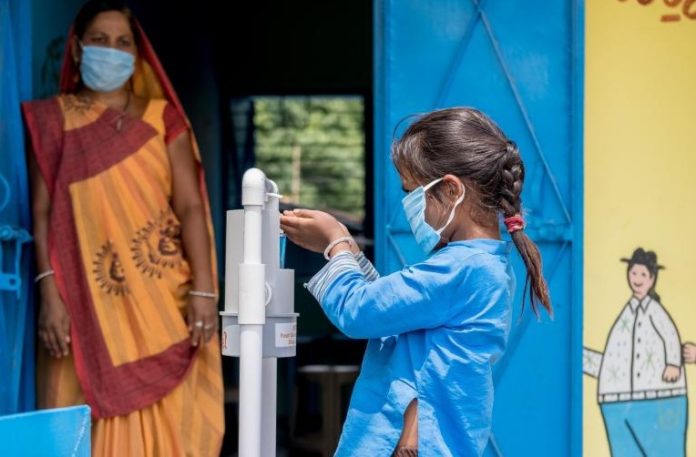New Delhi (NVI): 43 per cent of schools around the world lacked access to basic handwashing with soap and water last year – a key condition for schools to be able to operate safely in the midst of the COVID-19 pandemic, according to a joint report by the UNICEF and WHO.
According to the report, around 818 million children lack basic handwashing facilities at their schools, which puts them at increased risk of COVID-19 and other transmittable diseases.
More than one third of these children (295 million) are from sub-Saharan Africa. In the least developed countries, 7 out of 10 schools lack basic handwashing facilities and half of schools lack basic sanitation and water services.
Henrietta Fore, UNICEF Executive Director said, “Global school closures since the onset of the COVID-19 pandemic have presented an unprecedented challenge to children’s education and wellbeing.”
“We must prioritize children’s learning. This means making sure that schools are safe to reopen – including with access to hand hygiene, clean drinking water and safe sanitation,” she added.
The report further said that of the roughly 818 million children who lacked a basic handwashing service at their school, 355 million went to schools which had facilities with water but no soap, and 462 million to schools which had no facilities or water available for handwashing.
In 60 countries at the highest risk of health and humanitarian crises due to virus, three-quarters of children lacked the basic ability to wash their hands at school at the start of the outbreak, while half lacked basic water service.
Meanwhile, the report stressed that governments seeking to control the spread of COVID-19 must balance the need for implementation of public health measures versus the associated social and economic impacts of lockdown measures.
The partners said that evidence of the negative impacts of prolonged school closures on children’s safety, wellbeing and learning are well-documented.
“Access to water, sanitation and hygiene services is essential for effective infection prevention and control in all settings, including schools,” said Tedros Adhanom Ghebreyesus, WHO Director-General.
“It must be a major focus of government strategies for the safe reopening and operation of schools during the ongoing COVID-19 global pandemic,” he added.
The report identifies resources for COVID-19 prevention and control in schools, including 10 immediate actions and safety checklists. It builds on guidelines on the safe reopening of schools issued in April by UNESCO, UNICEF and partners, geared towards national and local authorities.
These guidelines include several protocols on hygiene measures, use of personal protective equipment, cleaning and disinfection, as well as providing access to clean water, handwashing stations with soap, and safe toilets.
UNICEF and WHO also underlined their commitment to achieving equitable access to adequate water, sanitation and hygiene services worldwide, including through the ‘Hand Hygiene for All’ initiative that supports vulnerable communities.
-RJV/ARK







